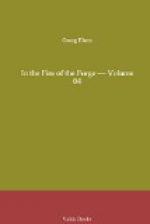So life went on until the Reichstag brought the von Montforts, whom he had met at a tournament in Augsburg, to the city of Nuremberg.
Mirth reigned wherever Countess Cordula appeared, and Siebenburg needed amusement and joined the train of her admirers—with what evil result he now clearly perceived for the first time.
He again stood before the stately dwelling where he had hoped to find luxury and wealth, but where his heart now throbbed more anxiously than those of his kinsmen had formerly done in the impoverished castle of his father, who had died so long ago.
The Eysvogel dwelling, with its showy escutcheon above the door, was threatened by want, and hand in hand with it, he knew, the most hideous of all her children—disgrace.
Now he also remembered what he himself had done to increase the peril menacing the ancient commercial house. Perhaps the old man within was relying upon the estate of Tannenreuth, which he had assigned to him, to protect some post upon which much depended, and he had gambled it away. This must now be confessed, and also the amount of his own debts.
An unpleasant task confronted him but, humiliating and harassing as was the interview awaiting him beyond the threshold before which he still lingered, at least he would not find Wolff there. This seemed a boon, since for the first time he would have felt himself in the wrong in the presence of his unloved brother-in-law. Even the burden of his debts weighed less heavily on his conscience than the irritating words with which he had induced his father-in-law to break off Wolff’s betrothal to Els Ortlieb. The act was base and malicious. Greatly as he had erred, he had never before been guilty of such a deed, and with a curse upon himself on his bearded lips he approached the door; but when half way to it he stopped again and looked up to the second-story windows behind which the twins slept. With what delight he had always thought of them! But this time the recollection of the little boys was spoiled by Countess Cordula’s message to his wife to rear them so that they would not be like him, their father.
An evil wish! And yet the warmest love could have devised no better one in behalf of the true welfare of the boys.
He told himself so as he passed beneath the escutcheon through the heavy open door with its iron ornaments. He was expected, the steward told him, but he arched his broad breast as if preparing for a wrestling match, pulled his mustache still longer, and went up the stairs.




